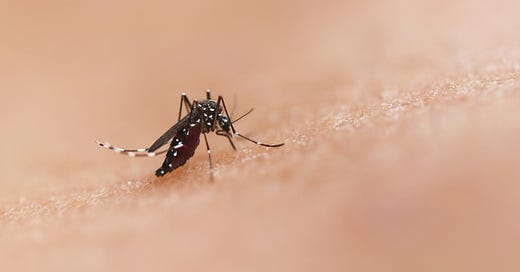Audacious Water Podcast: What to Do about Mosquitoes, with Mary Hayden
One takeaway: We need 'tiger moms' to fight tiger mosquitos.
In season four of my podcast, Audacious Water, I speak with ten diverse experts who intersect with how climate change is transforming America’s Heartland, which is becoming drier, hotter, saltier, wetter, and sicker. My goal was to deepen understanding of climate change and explore how to prepare and respond.
Why Mary Hayden?
Dr. Mary Hayden, a medical anthropologist and Research Professor with the Lyda Hill Institute for Human Resilience at the University of Colorado in Colorado Springs, joined me to explore how human behavior and water insecurity are reshaping the spread of mosquito-borne disease. From rural Colombia to U.S. cities, Mary studies how communities perceive risk, make decisions, and adapt to emerging threats.
We talked about how mosquito control is about climate–and behavior, communication and everyday choices. Water storage and poor infrastructure create mosquito habitat–so community education and behavioral change are the keys to real prevention.
I was particularly inspired by Mary’s vision of combining technology and the vigilance of women to reduce mosquito populations and protect their families. She said, “In much of the developing world, women are the ones who are responsible for the health of their families. And they're the ones who are working day-to-day with their families to ensure their health.” Never underestimate the power of mothers to make the world a better place.
Key Topics We Discussed
How Climate Change and Human Behavior Interact to Drive Disease Spread: Mary explains how shifts in temperature, precipitation, and elevation are helping mosquitoes like Aedes aegypti and Aedes albopictus thrive in new environments.
The Role of Water Insecurity in Creating Breeding Grounds: We discuss how water storage in under-resourced communities—driven by lack of reliable access—can unintentionally fuel mosquito outbreaks, especially in places already vulnerable to disease.
Why Fogging Isn’t the Solution: Mary breaks down why fogging and spraying often fail to control mosquito-borne disease, particularly with urban mosquitoes like Aedes aegypti, and highlights more effective, community-level strategies.
Public Health Messaging and the Power of Education: From identifying mosquito larvae to recognizing risk, Mary outlines how tailored, trusted, and practical public health messages can help people take action before an outbreak begins.
A Dream Project to Empower Women: Mary shares her vision for using mobile technology to help women in low-resource settings monitor vector-borne disease risk at the household level—and take proactive steps to protect their families.
Money Quotes from Mary
“ We saw the introduction of Aedes albopictus, which is often referred to as the Asian Tiger Mosquito, into Houston in 1985, and it was in used tires. It’s made its way all the way up the Eastern seaboard, into as far north as Maine.”
“I think it’s really important that we prioritize this idea of water security because that’s how we’re going to manage vector-borne diseases.”
Links to Relevant Studies and Resources
Learn more about Dr. Mary Hayden and her work at the Lyda Hill Institute for Human Resilience.
Read about CDC’s climate-related vector-borne disease work, which Mary discusses in this episode.
Learn about the CDC’s Zika Postpartum Emergency Response Study in Puerto Rico during the 2016 outbreak.
Further Reading
Mary discusses the risks of water insecurity and mosquito breeding. Read this 2021 study from the American Journal of Tropical Medicine and Hygiene on how household water access and storage practices shape Aedes aegypti breeding in Mexico.
Mary highlights the limitations of fogging during mosquito outbreaks. Learn more about integrated vector management—an approach that combines community engagement, environmental control, and targeted strategies to reduce disease risk.




